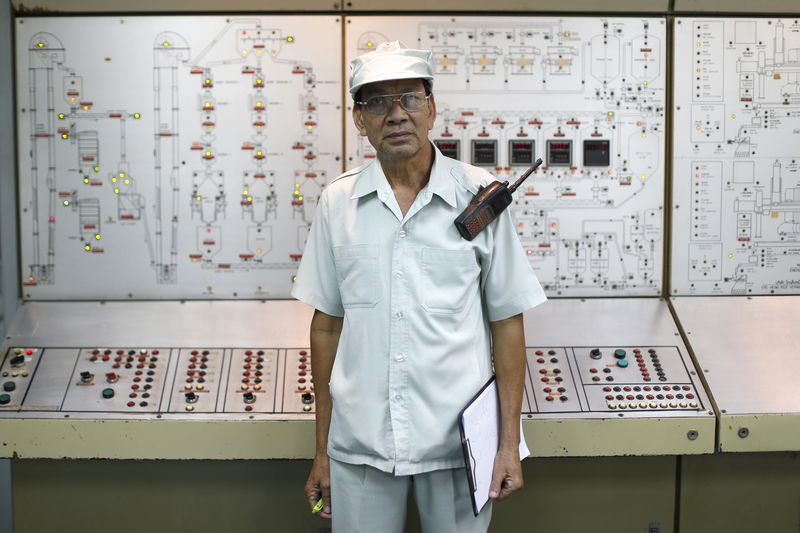By Pairat Temphairojana
BANGKOK (Reuters) - Pornsak Bowornsrisuk pulls an umbrella towards him to shield his head of thick grey hair from the blazing sunshine at the Bangkok bus terminal he manages.
"You've got to be damned tough to do this job," says the 63-year-old, who records bus arrivals and departures, and tots up fares collected from journeys across Thailand's capital.
Septuagenarian bus conductor Pranom Chartyothin moves nimbly to a door to guide students off the vehicle. She waves at the driver, 66-year-old Plang Pansaior, who glances in his rear view mirror before pulling away.
Such scenes will only become more common in Thailand as its population rapidly ages, unlike its neighbours with more youthful populations. The World Bank estimates the working-age population will shrink by 11 percent by 2040, the fastest contraction among Southeast Asia's developing countries.
Thailand's stage of economic development, the rising cost of living and education, and a population waiting longer to get married are among the reasons it is ageing more quickly than its neighbours. An effective contraception programme in the 1970s also played a part, said Sutayut Osornprasop, a human development specialist at the World Bank in Thailand.
Thailand's fertility rate dropped to 1.5 in 2013 from 5.6 in 1970, according to United Nations data.
The government is urging businesses to hire more older people to soften the impact of the ageing workforce on productivity, as well as limit the rise in the cost of its modest pension scheme.
Thailand will have to boost productivity to foot the bill for supporting the elderly, Bank of Thailand Governor Veerathai Santiprabhob told Reuters in an interview in January.
"Everyone has to be able to earn more to be able to shoulder the cost of our ageing society," he said.
The state paid 61.37 billion baht ($1.73 billion) in 2015 in pensions and the cost is expected to rise by 16 percent to 71.23 billion baht in 2020
OLDER WORKS KEEP THEIR COOL
The government established a Department of Older Persons in March 2015 to tackle elderly employment and related issues.
The Bangkok Transport Co, which employs Pornsak, Pranom and Plang, is embracing the change. Around 13 percent of its workforce is over 60. The firm likes older staff as they can keep their cool in Bangkok's bumper-to-bumper traffic, said the director Phatharawadee Klomjaroon.
"Bangkok's streets are jammed," she said. "Young employees sometimes still cannot control their temper, but the older employees are focused and more mindful. They can keep a calm demeanour when it comes to driving."
With monthly pensions of 600-1,000 baht a month ($17-$28), many Thais have no choice but to keep working.
"It is tiring but we just have to keep going. There isn't anyone to take care of me," said Pranom, who used to work as a cleaner and became a bus conductor after her husband died.
Nearly 40 percent of the 10 million Thais who are above the mandatory retirement age of 60 are still in the workforce, said Anusan Thienthong, head of the Department of Older Persons.
The government is considering extending the retirement age for some occupations, he said.
Just outside the Thai capital, the Cho Heng Rice Vermicelli Factory Co, says more and more older people are seeking jobs.
"We're getting more calls asking if we accept old applicants," said factory owner Varatus Vongsurakrai, adding that 62 of his 1,600 workers are over retirement age. He said he valued older workers for their reliability and experience.
One of those is Darunee Kamwong, 72, a cleaner who has five children and helps pay for the education of two of her grandchildren.
"I think I'll work another five years," she said. "I'm old already but I can't rest just yet."

($1 = 35.4700 baht)